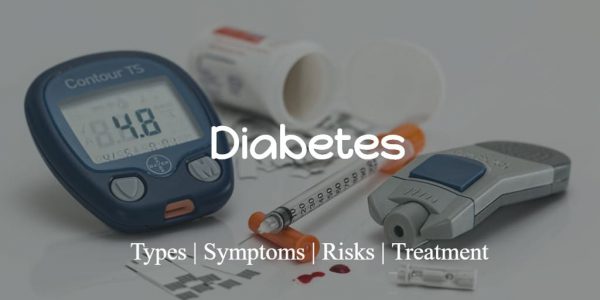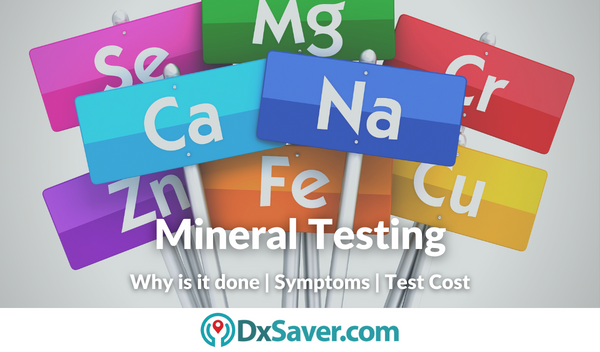
Understanding the essential minerals in your body is key to maintaining optimal health and well-being. A mineral test is a great way to check your mineral levels, as it can provide you with insight into the various minerals that are present in your body. By conducting a mineral test, you can gain a better understanding of your mineral levels, and how they may be affecting your overall health.
In this blog, we will discuss why you need a mineral test, what it can tell you, and the importance of understanding your mineral levels.
- What are the essential minerals?
- What are mineral deficiencies?
- What are the symptoms that indicated you have a mineral deficiency?
- What causes mineral deficiencies?
- How to diagnose mineral deficiency?
- What is mineral testing?
- Why take a mineral test?
- When to take a mineral test?
- What prerequisites are needed to take the mineral test?
- Providers Locations
For our readers who are interested in knowing the mineral test cost beforehand, we begin with that section.
How much does mineral testing cost?
A mineral test costs $129 in the U.S. The cost of a mineral test also depends on your choice of visiting the nearest lab or getting tested at home using the mineral home test kit. Complete the procedure and get the results in your email in 2 to 5 business days. Doctor consultation is also available for further treatment or any kind of medical advice.
The following table shows the mineral home test kit cost by one of our partners located in the U.S.
Name of our Partner Labs | Order Online |
LetsGetChecked
| $129 |
Mineral test cost with insurance
Many insurance companies in the U.S. cover all the vital tests like the mineral test. However, the coverage provided by private health insurance companies and national health insurance programs like Medicare varies widely. Most health insurance policies cover mineral test costs only once or twice a year and when your physician orders more than twice a year, you should pay the test cost out of pocket. So, you are recommended to check if your health insurance policy covers the mineral test cost.
Our mineral testing provider, LetsGetChecked accepts FSA and HSA health cards but does not accept any kind of health insurance policy. However, if you need to claim insurance, our partner can provide you with an itemized receipt containing all the details viz the name of the test, code of the test, and CPT code which is necessary for insurance reimbursement purposes.
What are the essential minerals?
For your human body to function effectively, vital minerals such as Calcium, Copper, Magnesium, Selenium, and Zinc are considered important requisites. The body uses minerals for a variety of functions, including ensuring that your heart, brain, muscles, and bones are all in good health.
The importance of each of these minerals can be listed as follows:
Copper is crucial for maintaining a healthy immune system, blood vessels, and neurons also help in assisting the metabolism of iron. Foods like liver, almonds, seafood, wheat bran products, and chocolate all contain copper.
Magnesium is a mineral that supports heart health, bone and tooth growth, and the health of nerves and muscles. Spinach, legumes, nuts, seeds, dark chocolate, whole grains, and liquids like mineral water are dietary sources that consist of magnesium.
Selenium is a critical mineral that is required for thyroid and hormone function as well as for reproduction, metabolism, and immunity. Steak, chicken, fish, eggs, dairy, bread, cereal, and other grains are frequently found sources of selenium.
Zinc is an important mineral that aids in the synthesis of new cells and enzymes and the maintenance of a robust immune system. In addition to immune system repair, Zinc is also responsible for the metabolism of carbohydrates, lipids, and proteins. Zinc is found in a wide variety of foods such as meat, milk, cheese, eggs, seafood, whole grains, nuts, and pulses.
Calcium is essential for healthy bones, blood coagulation, muscular contraction, and nerve signaling. Normal calcium levels aid in the correct development and growth of bones and teeth. If the body lacks calcium, it will begin to take calcium from the bones and teeth to make up for the deficiency, leading to brittle bones and teeth. Problems with the adrenal glands might result from an excess of calcium in the body.
The above-stated facts about the minerals substantiate the need for their presence in your body and it is important to keep a check on mineral deficiencies by conducting a mineral test.
What are mineral deficiencies?
Inadequate consumption of certain important nutrients gives rise to deficiencies in your body. As a result, a function that is directly related to these nutrients is impaired. Consequently, both vitamins and minerals are vital for the proper functioning of the human body.
However, it is important to understand that the human body needs all the 13 vital minerals and lack of any one of those vitamins causes vitamin deficiencies. Whereas only specific essential minerals are required for healthy nutrition it is referred to as having a mineral deficiency when a mineral element that is critical to the body is present in extremely low concentrations,
Symptoms that indicate you have a mineral deficiency
Your body demands each mineral to be present in different amounts and the symptoms that occur from the deficiency of each mineral are listed as follows:
Symptoms of Copper deficiency:
- Anemia
- Erratic heartbeat
- Skin pigmentation
- Brittle bones
- Reduced white blood cell count
- Premature graying condition
- Hair loss
- Thyroid problems
Symptoms of Magnesium deficiency:
Magnesium deficiency is not common among healthy people. Signs to be noted in the early stage are:
- Fatigue
- Nausea
- Reduced appetite
- Vomiting
If not treated immediately, calcium deficiency leads to symptoms such as
- Muscle cramps
- Arrhythmia (erratic heartbeats)
- Seizures
- Anxiety
- Discomposure
Selenium deficiency symptoms:
- Headaches
- Infertility or repeated miscarriage
- Reduced immunity (increased vulnerability to infections)
- Memory lapses and poor concentration
- Poor healing of wounds
- Hair loss
Zinc deficiency symptoms:
- Food allergy
- Diarrhea
- Gastrointestinal problems (glossitis, stomach pain, anorexia)
- Skin problems (acne, dermatitis, alopecia)
- Weakened neurological capacity
- Unexplained loss of weight
- Growth retardation
Symptoms of Calcium deficiency:
- Rough hair
- Dental decay
- Insomnia
- Muscle spasms
- Memory loss
- Ruptured nails
- Brittle bones (osteoporosis)
- Flaky and pale skin
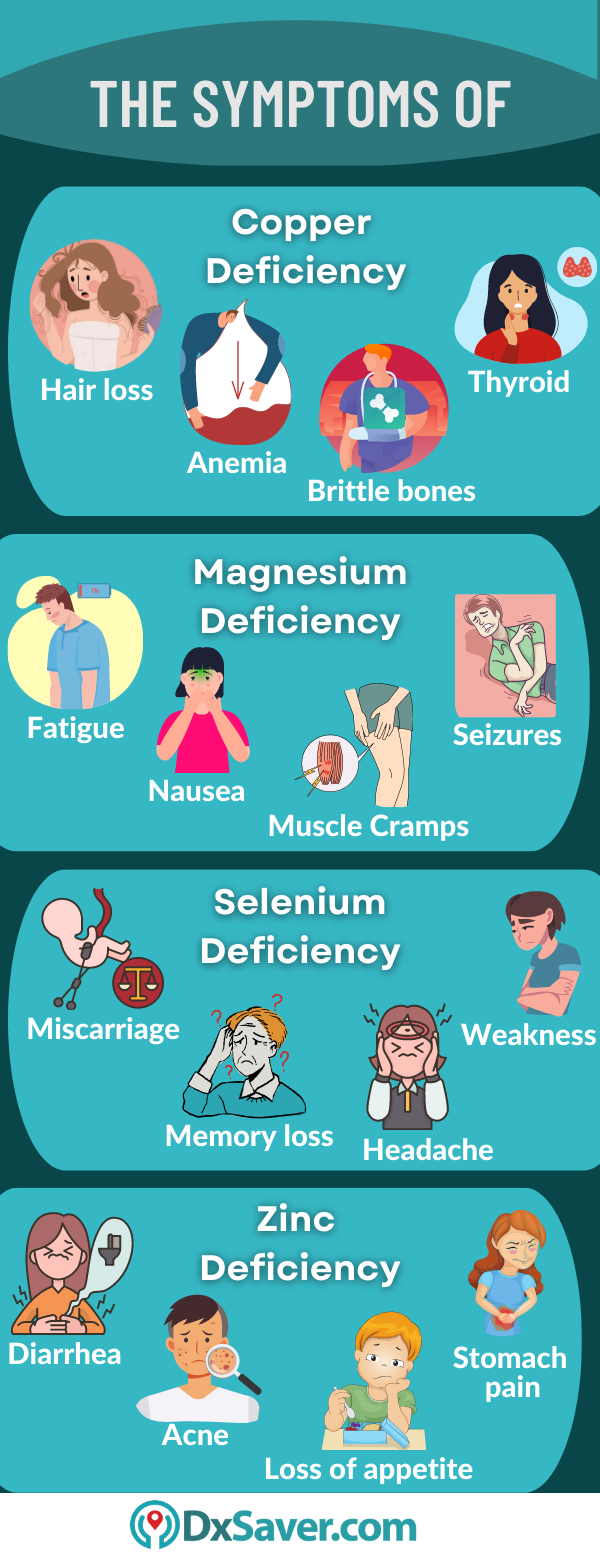
What causes mineral deficiencies?
Poor nutrition and reduced ability to absorb the minerals that are ingested are the major causes of mineral deficiencies. The factors that cause deficiency of each vital mineral are listed as follows:
Copper: Copper deficiency is frequently brought on by using zinc supplements. This is due to the fact that zinc typically dominates in the stomach’s competition between zinc and copper for absorption. As a consequence, Copper isn’t absorbed.
However, it is mainly caused due to
- Insufficient consumption of foods rich in copper (whole grain, shellfish, oyster, seeds, and more).
- Foregut surgery
- Enteropathies with malabsorption
- Prolonged intravenous nutrition
Magnesium: The factors that strongly contribute to the deficiency of magnesium are:
- Irregular consumption of magnesium consisting of foods (legumes, vegetables, and cereals)
- Persistent drinking
- Intake of medications such as laxatives
Severe health conditions that cause Mg deficiency are:
- Type 2 diabetes
- Diarrhea
Selenium: Selenium insufficiency is uncommon and is brought about by the following:
- Improper consumption of the sources of selenium(meat, seafood, and nuts)
- Substantial impairment of intestinal function
- Complete parenteral nourishment,
- Those who have undergone gastrointestinal bypass surgery
- Old age (i.e., over 85).
Zinc: Factors that lead to zinc deficiency are:
- Reduced consumption of meat, legumes, spinach, and okra
- Facing difficulty to absorb the micronutrient
- Higher metabolic requirement
The other factor leading to deficiency in zinc is the presence of chronic illnesses such as:
- Diabetes
- Skin cell disease
- Intestinal ailments
Calcium: Calcium deficiency is caused due to
- Improper consumption of calcium-rich food (milk, cheese, etc.)
- Aging
- Intake of medications such as diuretics
- Kidney failure
- Celiac disease
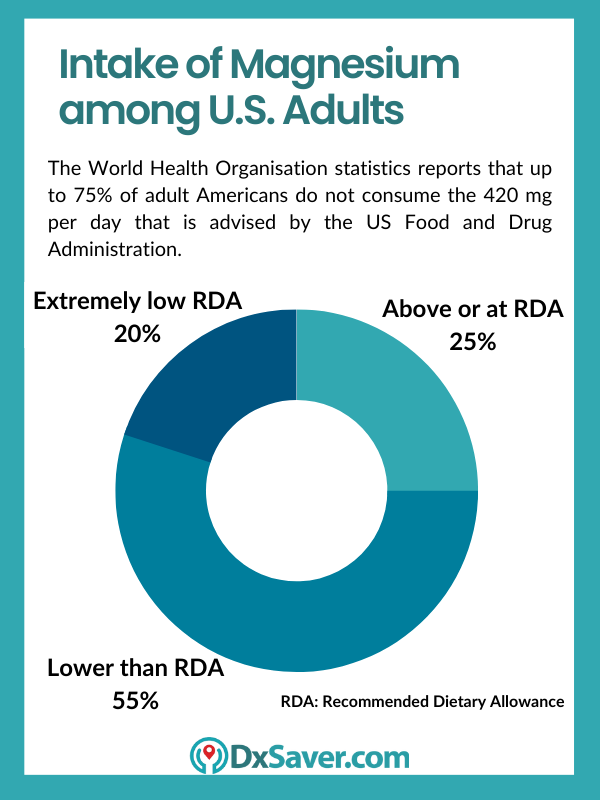
How to diagnose mineral deficiency?
The most common form of mineral deficiency diagnosis is mineral testing. Testing is carried out to measure the level of minerals present. Blood tests to check mineral levels can be done either through a lab or by using at-home mineral testing kits. Based on the results obtained you can consult with the doctor for further steps to be followed.
In severe cases, you can visit the hospital directly where the doctors review your medical history and perform clinical observations that are mandatory to diagnose the issues that arise from deficiencies in minerals.
For example, if you are suffering from fragile bones and become prone to fractures, then a physical examination is conducted followed by the bone mineral density (BMD) test. A bone mineral density (BMD) test determines the amount of calcium and other minerals in a specific location of your bone.
This test aids your doctor in identifying osteoporosis and estimating your risk of suffering a bone fracture.
What is mineral testing?
A mineral test is a procedure that deals with examining important minerals and detecting deficiencies—or in certain cases, sensitivities such as toxicity. Measuring the mineral content through a mineral test of your hair or blood gives you information about your levels of nutrients.
This kind of testing frequently includes minerals such as copper, zinc, magnesium, and all the vital minerals required to maintain a healthy lifestyle. A finger prick is the collection method used to test for the presence of minerals in your body.
Why take a mineral test?
A decline in the functioning of different organ systems and the human body as a whole can be brought on by excess minerals or mineral deficiencies. Ratios of these minerals are hence considered significant.
Lack of regular checks up on body minerals can lead to minor symptoms or cause serious conditions. For example, a lack of Copper minerals can lead to anemia, osteoporosis, and vitiligo while high toxic levels of Copper can result in (postpartum) depression and liver cirrhosis. organ damage; lack of Selenium can lead to conditions such as severe hair loss, broken nails, cancer, and infertility.
Thus, it becomes imperative to perform regular testing since it is crucial to determine your mineral level because most people with minor mineral deficiencies or excess will not exhibit any symptoms. A mineral test helps to gain insights into relative and absolute inadequacies, toxicities, and mineral imbalances.
The test has two potential uses: diagnostic and preventative. The test can shed light on how dietary modifications or supplements affect a person’s health. Such tests highlight the need for people to educate themselves about minerals and their symptoms to take preventive measures. A symptom disease chart can help identify various health problems.
When to take a mineral test?
Mineral deficiencies are common among many people. Thus, it is advised to take a mineral test when:
- Your body develops any health issues that influence how well food is absorbed or is facing any side effects from certain drugs.
- You consume a vegetarian or vegan diet because your body has a tougher time absorbing iron from plant-based sources.
- Women who experience menopause, excess menstruation and pregnancy are required to identify the optimal mineral requirements
- You frequently experience muscle cramps, hair loss, irregular heartbeats, joint soreness, loss of appetite, and difficulty in breathing.
Where to take the mineral test?
Mineral checks can be done using mineral test kits available online. A simple finger prick method is used to collect blood samples and review your blood results.
Our partner, LetGetChecked, provides blood sample collection kits to perform mineral tests. With the help of this at-home mineral test, you will find out how much of the vital minerals you need for good immune function, normal growth and development, and general well-being.
What prerequisites are needed to take the mineral test?
Mineral testing is used as a checking tool for treating health issues. There are many who take nutrient supplements or medications in their everyday diet.
Though the prescribed medicines do not affect the test results, medications such as Biotin, Acetaminophen, steroids, and antidepressants can hamper the test results. Because of this, it is suggested as a mandatory prerequisite to avoid mineral or vitamin supplements for a minimum of 48 hours. Any changes regarding the consumption of prescribed medicines or extra supplements should be duly consulted with the physician.
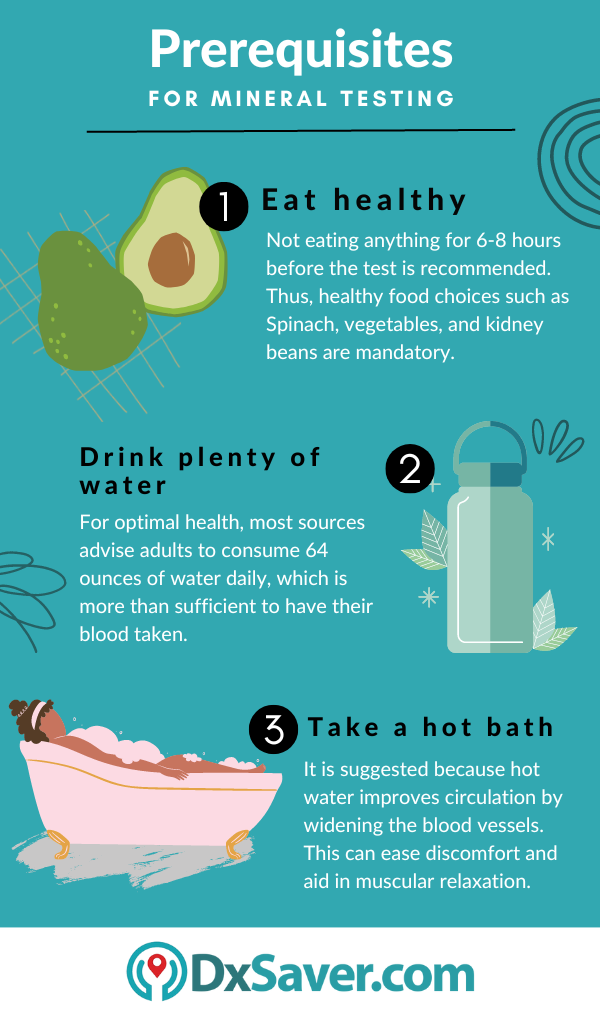
To ensure that the test is taken accurately, the following basic steps are recommended for you to follow before taking the mineral test.
- Take a warm shower or wash your hands in warm water, since the heat will increase your blood circulation.
- When you take the sample, make sure you are hydrated.
- Long nails might make it challenging to obtain the sample.
It is advised to use the fourth finger on the left hand for mineral testing. Do not pierce or collect from a newborn finger or any other body part that is not specified in the instructions.
Frequently asked questions:
What does the LetsGetChecked mineral kit test for?
The kit checks for minerals, Copper, Magnesium, Selenium, and Zinc.
How often should vitamin levels in the blood be assessed?
There is no specific set of instructions regarding the frequency of doing a test to check your vitamin levels. Consult your doctor to determine if routine vitamin blood levels testing is required if you already have a deficit that has been identified.
What mineral deficiency causes anemia?
A lack of copper and iron minerals can lead to anemia.
What are the most common symptoms of mineral deficiency?
Fatigue, muscle cramps, excess hair loss, broken nails, and shortness of breath are the most commonly faced symptoms of mineral deficiency.
Which mineral deficiency causes hair loss and broken nails?
Mineral deficiency in general causes hair loss and broken nails. However, in particular, a lack of zinc and selenium minerals are the primary contributors to these symptoms.
Other topics you may be interested in:
- APOE gene test: Importance on brain health, symptoms, and test cost
- PCOS Testing: Symptoms, Causes, and Testing Cost
- What is Glyphosate Exposure: Symptoms, Testing Cost, and Prevention
- Cost of a PFAS Blood test in the U.S.
- Symptoms of mental disorders
- What MTHFR Gene mutations?
- What is gut health?
- A Comprehensive Guide on Skincare, Skin Problems, and Skin Health
- Treatment of tapeworm infection
- Test cost for Magnesium Blood Test in the U.S.
- How to order an at-home Gonorrhea test kit?
- The purpose of an IgE Allergy test
- Causes for Stinging Insect Allergy
- How to order an at-home Herpes test kit?
- What is the purpose of a wellness checkup?






